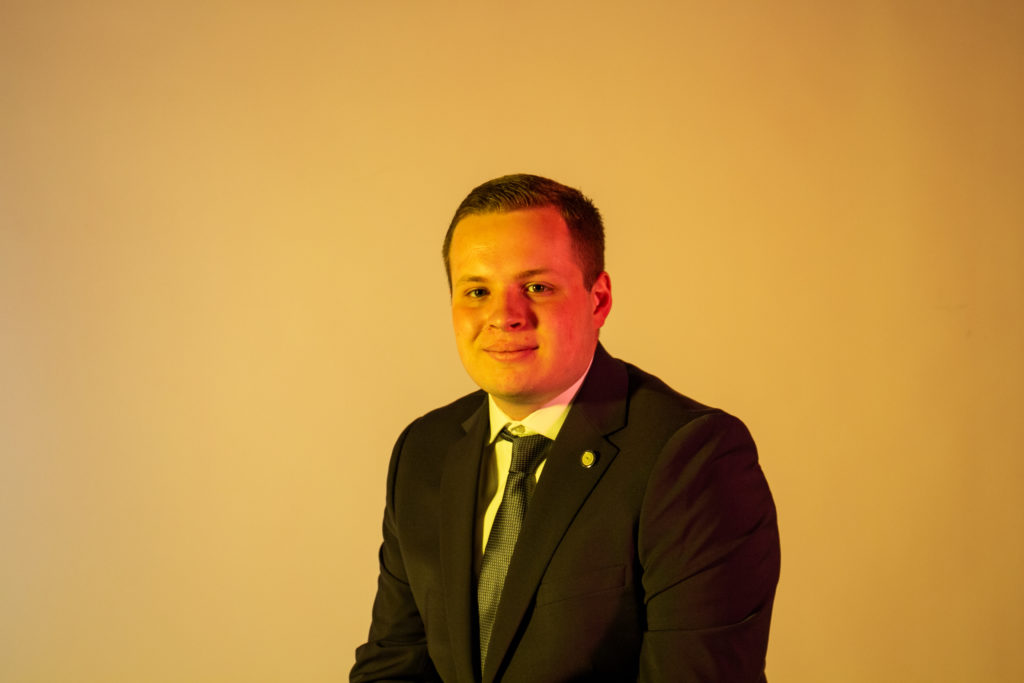While the contest for Student Association vice president is far less crowded than the presidential race, whoever holds the position will play a key role in guiding the SA’s future. The SA’s vice president must work with both the SA president and the senate while engaging in advocacy of their own.
SA Senate Chairperson Pro Tempore Demetrius Apostolis has the experience, expertise and personal connections to succeed as SA vice president, and he deserves students’ votes.
Apostolis, a sophomore and the third-highest ranking member in the SA, has worked with students, faculty and officials to manage the senate’s internal affairs and helped plan February’s Career Exploration EXPO. And he’s already had some experience as vice president, albeit in an acting capacity – Apostolis took over the position for one week over the summer while current SA Vice President Yan Xu was on a medical leave of absence.
Granted, these are past experiences and accomplishments, but Apostolis has several ideas that would benefit both GW and the SA in the future.
Apostolis’ proposal to expand Counseling and Psychological Services for LGBTQ+ students caught our attention. Rather than hiring new counseling staff – something that during our meeting he recognized isn’t up to the SA vice president – Apostolis would advocate to move CAPS’ scheduling online and allow students to specifically request LGBTQ+ staff. Though that’s still easier said than done, such a move would go a long way to supporting every student – and it demonstrates Apostolis’ understanding of the issues his peers face.
An entire section of Apostolis’ platform focuses on graduate students, who he said also make up a majority of his campaign team. He said graduate students may not feel like they’re part of GW, and he promised to integrate them into the rest of the University community through a regular SA newsletter for graduates and a mentorship program between them and undergraduates.
Apostolis also hopes to reform the SA itself, especially its Finance Committee, which allocates funding for student organizations. He said he’d open the Finance Committee’s meetings to the public and rework how student organizations receive funding from the SA. Instead of forcing student organizations to stretch a lump sum over the year, Apostolis would fund their events as they occur – a much more reasonable and effective way of ensuring GW’s clubs receive the money they need.
But Apostolis isn’t just focused on students’ on-campus experience. Another of his plans would extend the University’s U-Pass program over the summer and expand its eligibility to part-time graduate students. It took years of student advocacy to bring U-Pass to GW, and it’s transformed how students travel around the District. Letting more students into the program would only make it more beneficial.
Apostolis said he draws inspiration from former SA Vice President Kate Carpenter, who helped push U-Pass over the finish line and whose successful tenure encouraged him to get involved in the SA. Like Carpenter, who ran for and was elected to her position in 2021, Apostolis has a solid platform, firsthand knowledge of the SA and the drive to be a recognizable presence on campus.
The only other candidate running for vice president, SA Treasurer Arya Thakur, drew a marked contrast to Apostolis when we spoke to him. Thakur told the editorial board his plans were outlandish, out of the box and not easily implemented, especially his proposal to bring football back to GW.
While some of Thakur’s ideas, like making Finance Committee meetings open to the public or creating a Title IX task force, are clearly achievable, his approach toward the office as a whole gave us pause. As Thakur described it, his platform proposed a long-term vision for the SA. Yet most students spend only a few years at GW – they don’t have time to wait for decadeslong plans to come to fruition.
We understand the value of bold and even unpopular ideas, and we appreciate Thakur’s self-awareness. But students are best served by an SA vice president who can create real change, even if it is small – incrementalism is not a dirty word.
Apostolis’ agenda is also ambitious, but he knows the limits of his position, his solutions are realistic and pragmatic and he’s knowledgeable about the issues he intends to address. From the average response time of the GW Police Department to the officials he’d work with to make his plans a reality, Apostolis had an answer to most if not all of the editorial board’s questions. In a two-person race, Apostolis pulled ahead on his own merits.
Apostolis’ plans are a testament to his experience and the connections he’s fostered throughout the University community. With students’ votes this week, he can put that experience and those connections to use as the SA’s next vice president.
The editorial board consists of Hatchet staff members and operates separately from the newsroom. This week’s staff editorial was written by Opinions Editor Ethan Benn and Contributing Opinions Editor Julia Koscelnik, based on discussions with Sports Editor Nuria Diaz, Managing Editor Jaden DiMauro, Culture Editor Clara Duhon, Design Editor Grace Miller and Social Media Director Ethan Valliath.



